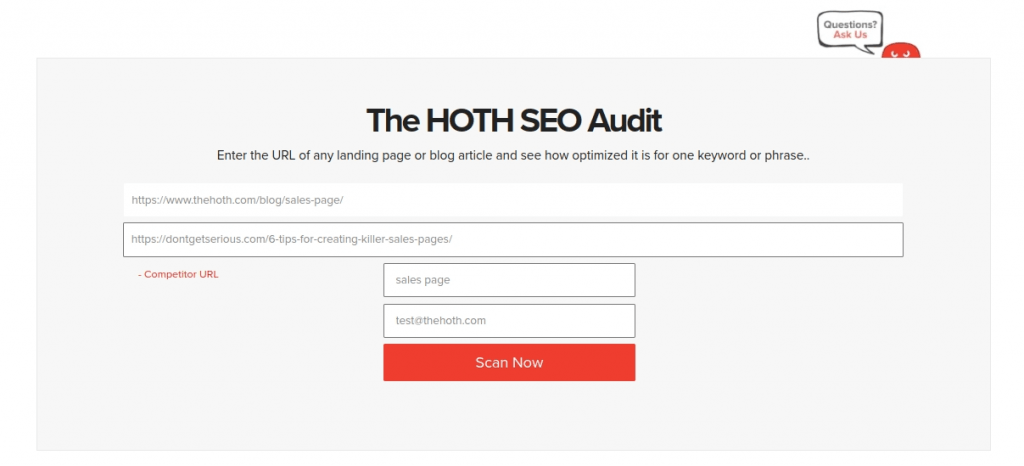As crucial as your on-page SEO efforts are, all it takes are a few technical issues to bring your entire strategy crashing to the ground.
If web bots aren’t able to properly crawl & index your web pages, your online visibility will take a serious blow. In fact, you may disappear from the SERPs altogether.
That’s why technical SEO is equally as important as your on-site and off-site SEO efforts.
Not only does it ensure your website is optimized for search engine crawler bots, but proper technical SEO will also improve your user experience, page loading times, internal linking structure, and mobile-friendliness.
Yet, your technical tweaks won’t get far if you don’t have the proper technical SEO tools in place.
For instance, you need to be able to do the following:
- Conduct SEO audits
- Check your website’s page loading times
- View crucial SEO metrics
- Check how Google views your website content
- Fix broken links
- Find duplicate content
- Create & upload XML sitemaps
- Replace 404 pages with 301 redirects
- Clean up messy Javascript & CSS
- Test schema structured data markup
- Optimize your website for mobile devices
These are just a few of the tasks associated with technical SEO, and you’ll need some free tools to help you complete them all properly.
Read on to discover the top 11 technical SEO tools that you need to start using today.
Why Do Technical SEO Tools Matter?
Technical SEO involves knocking out a myriad of complicated tasks that are near impossible to complete without helpful testing tools.
For instance, how are you supposed to know how fast your pages load without using a tool to check them? It’s not something you can eyeball, as you need specific numbers to know if you’ll pass Google’s Core Web Vitals test or not.
Without using a tool like Google’s PageSpeed Insights to uncover your speed metrics, you’ll just be shooting in the dark.
That’s why technical SEO tools are necessary because they remove all guesses from the equation.
The best technical SEO tools will provide you with in-depth metrics that you can use to refine your strategy without leaving anything to chance. They also provide essential functions like creating XML sitemaps, uncovering duplicate content, and fixing indexing errors.
In short, you have nothing to lose and everything to gain from using technical tools, especially since most of them are either free or have free versions.
The Top 11 Technical SEO Tools Available Right Now
There is no shortage of SEO tools online meant to help fix technical issues, but they aren’t all of equal quality.
Some tools require expensive memberships yet only provide basic SEO services that you can easily replicate with free tools.
That’s why we’ve compiled a comprehensive list of the 11 highest quality and most useful tools to bolster your technical SEO strategy.
These tools will handle everything from improving page speed to testing your structured data markup and everything in between – so don’t wait to check them out.
GSC is an excellent tool for any SEO strategy, and technical SEO is no exception.
Google Search Console is so useful because it gives you a first-hand view of how Google views your website.
It also points out any crawling errors that Google bots are experiencing with your pages.
The Index Coverage Report is one of many helpful performance reports you can run in GSC, and it points out the indexing status for every one of your web pages.
There are a few statuses available, including the following:
- Error. This means that Google wasn’t able to index your page due to an error, and clicking on the error will identify it and provide suggestions for resolutions.
- Valid with warnings. Google has indexed these web pages, but there’s still a pressing issue that you should deal with (it’s likely related to essential ranking factors or Google’s policies).
- Valid. This means that the webpage was successfully indexed and will appear in the SERPs.
- Excluded. This status appears for web pages with noindex tags, which tells Google that you don’t want the page to appear in the SERPs.
Another invaluable performance report for technical SEO is the Page Experience Report.
Running this report will ensure your website can pass the Core Web Vitals test, has HTTPS set up, and is optimized for mobile devices. It’ll also let you know how many pages on your website have an optimal page experience, which will help you improve your UX.
In short, GSC is an essential tool for its ability to point out indexing errors & problems with your page experience, which will help you refine your technical SEO.
Another one of Google’s essential free tools (there will be many on this list) is Google Analytics. Just like GSC, GA is valuable for your technical SEO due to its reporting capabilities.

Not only that, but it’s an excellent tool for monitoring your performance in organic search, which is definitely a plus.
GA will notify you if you’ve incurred any penalties or are experiencing any traffic issues – such as an unexpected dip in organic traffic.
The great thing about Google Analytics is it provides a real-time view of what’s happening on your website. While website audit tools are excellent (there are a few on this list), they tend to point out problems well after they’ve occurred. Conversely, GA will notify you of important SEO issues as soon as they happen.
If you do notice a steep dropoff in traffic when you check GA, it’s usually a sign that you have an indexing or tracking issue – which you can use GSC to pinpoint and fix (which is why it’s worth using both tools in tandem).
Besides traffic issues, keeping an eye on essential metrics like your bounce rate & dwell time will also provide insights into your website’s technical performance.
For instance, if you notice users are bouncing as soon as they view your page, it’s likely a sign that you have page loading issues.
Another clue is if your dwell time is extremely short, which could also mean your content isn’t as engaging & hard-hitting as it needs to be.

Next up is our free SEO Audit Tool from The HOTH, which will provide you with tons of valuable technical SEO insights.
To run a report, you only need your website URL, name, and email address. From there, you’ll receive a comprehensive report covering the strength of your SEO profile, including essential technical aspects like page speed, performance, and usability.
You’ll receive an overall grade for your website, as well as individual scores for the following SEO elements:
- On-Page SEO
- Links
- Usability
- Performance
- Social
In addition, the reports feature detailed breakdowns of noticeable issues, such as duplicate H1 tags, images missing alt text, Javascript errors, the presence of schema markup, and hreflang attributes.
Other features of the report include:
- Checking for canonical tags
- Whether your meta descriptions are the optimal length (between 70 and 160 characters)
- Making sure your website isn’t using unwanted noindex tags
- Checking for a robots.txt file
- Ensuring your site uses HTTPS & SSL
- Checking for the presence of an XML sitemap
As you can see, our site audit tool will inform you of key technical SEO issues, like not having a sitemap or accidentally no-indexing pages that you want to appear in the SERPs.
You can also check your current keyword rankings, backlink profile, Moz domain authority score, and total organic traffic generated from the search.

This tool is one of the best ways to ensure you’ll pass the Google Core Web Vitals Test and that you’ll have an optimal page experience for your users.
It’s no secret that lightning-fast internet has spoiled everyone for many years now, and modern internet users are anything but patient when it comes to loading times.
So if your web pages are struggling with their loading speed, users won’t hang around past a few seconds – which will cause your bounce rate to increase & dwell time to go down.
Google’s PageSpeed Insights provides detailed metrics for your loading times, including how fast your website loads on desktops and mobile devices, which is a plus.
There is one important note to make about PageSpeed Insights, though.
It does not use the exact loading speed of your website; it uses approximations instead.
While these approximations are undoubtedly accurate, you should use more than one tool to get a clearer picture of your loading times.
However, a stand-out feature of PageSpeed Insights is its ability to point out and recommend potential solutions for problems with your loading times. There will even be a link under each issue it points out that says, “Show how to fix.”
That’s why this tool makes our list, as it’s an excellent way to find & resolve the top errors that are holding your loading times back.
PageSpeed Insights also provides the specific metrics that the Core Web Vitals test will measure, including your First Input Delay (FID), Cumulative Layout Shift (CLS), and Largest Contentful Paint (LCF).

Do you need a tool to help you uncover duplicate content and improper URL structures?
Then look no further than Screaming Frog, one of the best web crawlers online. It crawls many aspects of domains that affect SEO, including URL structures, canonical tags, page titles, meta descriptions, meta keywords, and images.
After crawling your website, you’ll know precisely where to focus your technical SEO efforts, which is a huge benefit.
Screaming Frog will help you quickly identify the following technical issues on your website:
- Images that are too large (which can affect loading speed)
- Errors in your URLs
- Canonical tag issues (i.e., more than one canon tag)
- Missing meta descriptions & meta keywords
- Missing page titles
- Response code errors
- Pagination issues
- Uncovering international SEO issues
These are all issues that can potentially tank your SEO profile, so it’s worth crawling your website regularly.
Many SEOs use crawlers like Screaming Frog every single day so they can quickly fix any technical SEO errors as soon as they arise. You can also use it to take a deep dive into your website’s architecture, which is invaluable for your technical SEO.
Why is that?
It’s because using a flat site architecture is the best way to avoid technical errors, and Screaming Frog can help you understand your current architecture so you can optimize it.
Not only that, but using Screaming Frog can also pinpoint inconsistencies in your URL structure, which is another no-no for technical SEO. Your URLs need to follow a rigid structure to make it easier for Google’s bots to crawl your site, and Screaming Frog is an excellent tool for spotting any errors.

Next is Google Search Central, formerly known as Google Webmaster Tools. It’s another free offering from Google that you can use to bolster your technical SEO efforts.
Key features include the ability to quickly pinpoint 404 errors, which are disastrous for your SEO and user experience. To fix them, replace any 404 errors with 301 redirects to pages that have similar content (or that can serve as a substitute).
Without a tool like Google Search Central, you’d have no way of knowing about your 404 errors, which is why it’s worth using.
It will also check your XML sitemap for errors, which is a unique feature that’s enormously helpful.
If your sitemap is riddled with errors, it’ll confuse search engines & provide a subpar experience for your users.
Google Search Central will highlight these errors, such as allowing you to remove duplicate page titles and descriptions.
You can also check your robots.txt file by using the tool, which will help you avoid no-indexing pages that you want to appear in the SERPs. While it’s crucial to noindex pages that you don’t need to generate organic traffic (i.e., admin pages, thank you pages, log-in pages, etc.), you’ll want to ensure that one of your blogs or product pages isn’t on the list by mistake.

Google practices mobile-first indexing, meaning your site needs a responsive design or a mobile version to appear in search results.
Not only will that ensure that your content displays correctly on mobile devices (which is excellent for your UX), but it’ll also help your SERP rankings. Since Google prioritizes indexing the mobile version of websites, having a site that only works on desktop computers won’t cut it.
Your best bet is to incorporate a responsive design, where you have one site that’s able to display on both desktop computers and mobile devices. It works by using a combination of flexible grids & layouts that are able to adapt to different screen sizes in real time.
Google rolled out mobile-first indexing in 2015, and they released their Mobile-Friendly Testing Tool to go along with it.
Using the tool is an excellent way to determine if your website is properly formatted for mobile devices, which will help you out in the SERPs.
A great feature of the tool is that it will provide recommendations for fixing any issues your site has with mobile optimization. Since the tool is straight from Google, passing its mobile-friendly test is a must.
Even if you’re confident in the reliability of your website design, double-checking that you pass the test is worth it. Otherwise, you may experience lower rankings than you would have if your website was fully responsive.

Targeting SERP features is a popular SEO strategy, but it requires proper structured data to pull off.
SERP features (also called rich results) are experiences that go beyond traditional blue hyperlinks, such as image carousels, eCommerce products, local businesses, and featured snippets.
Rich results appear above the organic search results in what’s called position zero.
It’s the holy grail of SERP rankings, which is why so many SEOs target rich results as part of their strategies.
However, if you don’t format your structured data properly, you won’t qualify for any rich results – meaning you’ll have wasted your efforts.
The solution?
Make use of Google’s Rich Results Testing Tool, which will let you know which SERP features can be generated (if any) from the structured data markup on your page.
After you input your data, the tool will let you know how many valid items it detects that are eligible for Google’s rich results. Additionally, the tool lets you preview how the rich results will look when they show up in Google search, granting you control over the appearance of your SERP features.
The primary reason to use the tool is to confirm with no uncertainty that you’ve formatted your structured data properly – and that your content has the potential to generate rich results. Without taking this step, you’ll leave your ability to appear in position zero up to chance.
While the Rich Results Testing Tool is Google-specific, the company also offers generic schema validation through its Schema Markup Validator, which is useful for validating Schema.org-based structured data embedded in web pages across the internet.

Do you have a serious problem with duplicate content that you’re trying to fix?
Then Siteliner is the tool to use, as it specializes in uncovering duplicate website content. Enter your domain, and the tool will crawl up to 250 pages at once, notifying you of all the duplicate content that it finds.
Duplicate content is a huge detriment to any SEO profile, as it confuses crawlers on which version they need to index & include in the SERP results.
Siteliner will help you quickly & easily identify duplicate pages that could cause such confusion, and it even allows you to analyze each page to determine what you need to do to avoid duplications. It could be that you need to designate specific pages as ‘canon’ by using canonical tags or get rid of the duplicate pages altogether.
Besides uncovering duplicate content, Siteliner has other useful features for technical SEO.
The Broken Links tab will help you uncover any broken links on your website at the click of a button. You’ll get to see a complete breakdown of all the broken links on your site, as well as page summaries for each (where the broken links are highlighted).
Once you uncover them, you can fix them by either adding a new hyperlink or using a 301 redirect.
You can also use Siteliner as a way to double-check your loading times & page sizes. Siteliner will display your average page speed and average page size in comparison to other websites – which is a great way to see how you stack up with the competition.

Do you run an eCommerce store or sell goods through your website?
Then an up-to-date SSL certificate is a must, not only for the security of your customers but also for your SERP rankings.
Google announced HTTPS as an official ranking factor in 2014, which uses SSL certificates as its protocol. Having an SSL certificate means all the data moving between your web server and browser stays private and secure.
That’s why websites that handle sensitive user information (like credit card numbers and medical files) need SSL certificates to keep their websites safe.
As a bonus, websites that use HTTPS/SSL certificates enjoy higher rankings on Google.
Even if you don’t run an eCommerce store or handle sensitive medical information, using HTTPS with an SSL certificate is still a good idea – as it’s a great security practice. SSL certificates will protect your websites from hackers, which is why they’re worth your time.
Yet, you need to make sure that your SSL certificate is still valid, which is where our free SSL Certificate Checker comes into the picture.
Enter your URL to quickly discover if you have an up-to-date SSL certificate or not. Google announced that they’d shut down any expired SSL certificates, which is why using this tool is a must.
Wrapping Up: The 11 Best Technical SEO Tools
The tools on this list will make performing an in-depth technical SEO audit on your website far easier.
From identifying duplicate content to fixing indexing errors, these tools will ensure all the technical aspects of your SEO strategy work flawlessly – making it effortless for web bots to crawl your website.
Do you need help with the technical SEO at your company?
Then don’t wait to check out our extensive technical SEO services at The HOTH. Our digital marketing gurus know everything there is to know about technical SEO. Book a call today!



